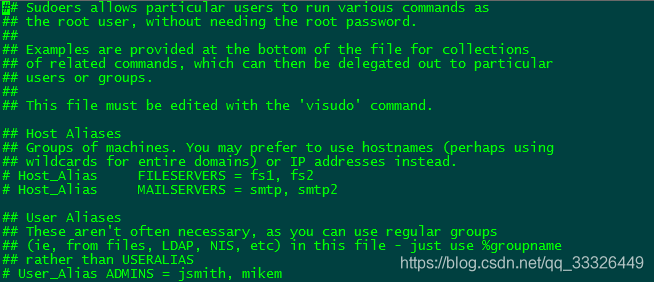Linux用户添加sudo权限
本文共 596 字,大约阅读时间需要 1 分钟。
1.背景:
sudo是Linux系统管理指令,是允许系统管理员让普通用户执行一些或者全部root命令的一个工具。Linux系统下,为了安全,一般来说我们操作都是在普通用户下操作,但是有时候普通用户需要使用root权限,比如在安装软件的时候。这个时候如果我们切回root用户下效率就会比较低,所以用sudo命令就会很方便。2.安装sudo
设置之前必须得安装sudo,安装方法:yum install sudo //这个安装包很小,不到1M
3.设置
(1)进入root用户,打开sudoers文件:su root //进入root用户
vim /etc/sudoers //打开sudo的配置文件
打开之后如下图所示:
 (2)修改sudoers文件 先找到如下图所示的一行:(root ALL=(ALL)ALL) 然后给普通用户kcc添加sudo权限,在“root ALL=(ALL)ALL”这一行下面,加入如下图所示的一行(kcc ALL=(ALL) ALL),并保存。 ps:有些小伙伴可能会注意到sudoers文件只是一个只读文件,其实强制修改的话也没关系,但是如果你觉得不安全,可以在修改文件之前先赋予文件写权限(W),修改保存之后再收回写权限,操作如下:
(2)修改sudoers文件 先找到如下图所示的一行:(root ALL=(ALL)ALL) 然后给普通用户kcc添加sudo权限,在“root ALL=(ALL)ALL”这一行下面,加入如下图所示的一行(kcc ALL=(ALL) ALL),并保存。 ps:有些小伙伴可能会注意到sudoers文件只是一个只读文件,其实强制修改的话也没关系,但是如果你觉得不安全,可以在修改文件之前先赋予文件写权限(W),修改保存之后再收回写权限,操作如下: chmod u+w /etc/sudoers
//进行修改,修改完成之后:
chmod u-w /etc/sudoers
转载地址:http://cmwcz.baihongyu.com/
你可能感兴趣的文章